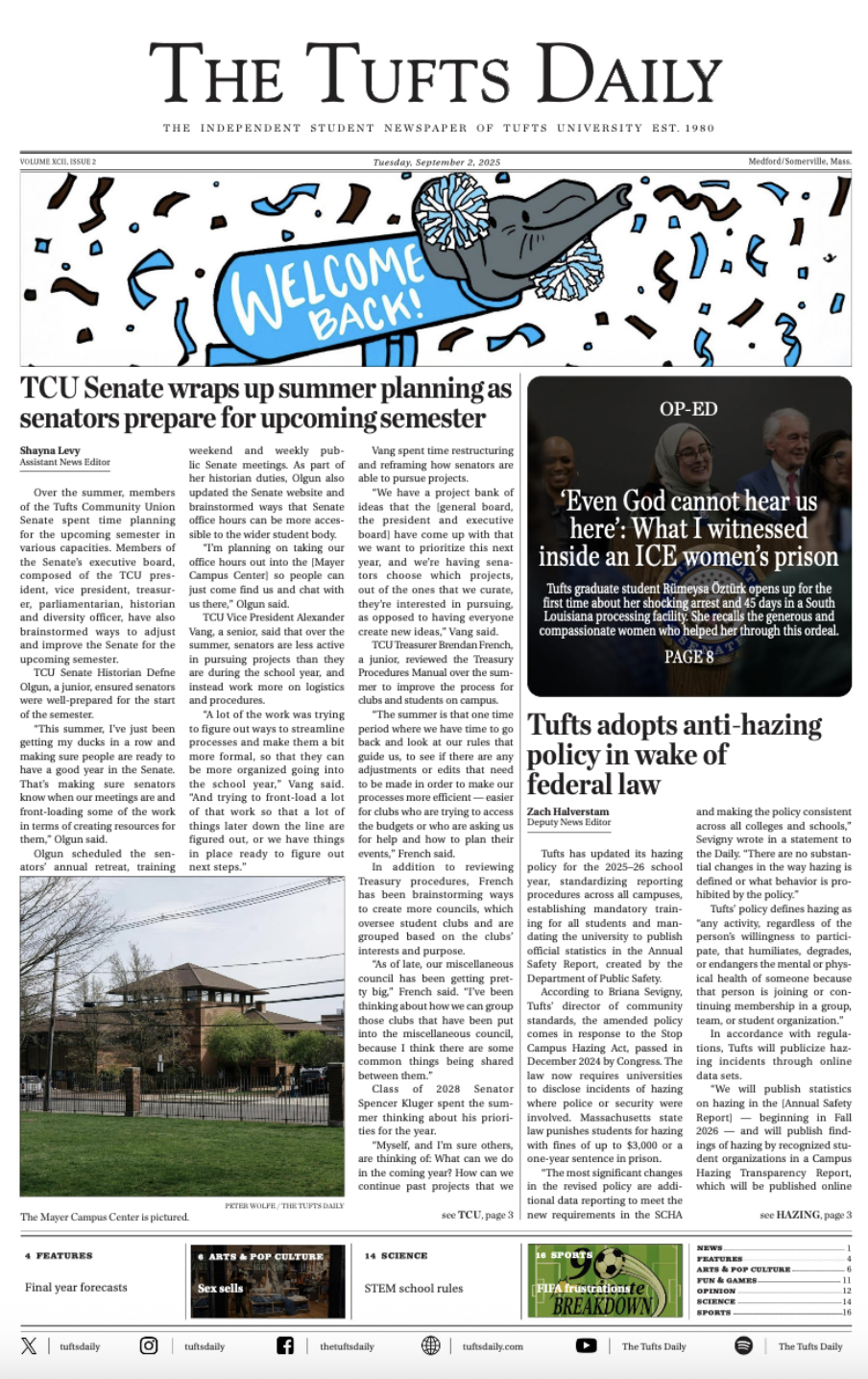Tufts alumnus Neil Swidey spoke at the Tisch College Civic Life Lunch about his work on the Alray Scholars Program, which aims to support Boston Public School students in completing their college degrees, on Feb. 5 in Barnum Hall.
The national graduation rate for college students who reenroll in their degree program after dropping out is about 25%, a figure that Swidey — through Alray — hopes to raise. The Alray Scholars Program helps students navigate the complications embedded in the reenrollment process of higher education.
In addition to being the Alray Scholars Program founder and director, Swidey is an editor-at-large at the Boston Globe and director of the journalism program at Brandeis University.
His presentation, titled “Giving Students a Second Chance at College,” described how the Alray Scholars Program provides one-on-one mentorship, scholarships and post-grad career services to help students from Boston Public Schools complete their college degree.
While working on his book, “The Assist: Hoops, Hope, and the Game of Their Lives,” Swidey followed the athletic careers of inner city students through their college lives, including Alray Taylor. The Alray Scholars Program was founded in memory of Taylor, a Charlestown High School graduate, whose college career was cut short because of his parents’ passing. With plans to reenroll in university, Taylor was shot in Hyde Park at age 21 in 2006.
Swidey said working on the book revealed how common small missteps such as financial responsibility, transferring credits across universities, reenrollment or other exterior responsibilities can cause the derailment of college careers.
“I went looking for a nonprofit, where I could donate the proceeds of this book, and I couldn't find a single nonprofit in Boston working in this space,” Swidey said. Upon discovering this, he ultimately decided to organize one himself.
The Alray Scholars Program has had three in four of its scholars finish earning a degree where the national average for students who take a break and then return to college is just one in four. It has awarded over $600,000 in scholarship funding and supported over 80 graduates, many of which have gone on to complete their masters degree and one scholar completing a doctorate degree. Currently, Alray is working with about 54 scholars who have reenrolled in their universities to complete their degree.
“Nothing in college and higher ed is cost effective right now, but our average scholarship award is about $1,700 a semester and then just over $5,000 in their lifetime scholarship working with us,” Swidey said. “Students who have a bachelor's degree versus not make about $40,000 each year more. So it pays out very quickly.”
Swidey founded Alray in 2008, when he said there was a gap in the conversation. Not enough programs addressed college completion and supporting students during their education, not just before they get in.
“Back then, everyone was talking about college access,” Swidey said. “College access was: ‘Get low income students into college and that will level the playing field.’ At some level, that’s a big important on-ramp … but it’s only the first step.”
A major unresolved problem was “about two out of every three students in Boston public schools who are going to college were not earning any kind of degree,” Swidey said. “Boston Public Schools has great exam schools that tend to skew the numbers in terms of college billing and college completion.”
With a staff of three, Swidey says that Alray is “deliberately small and intimate.” The importance of mentorship became apparent to him during the process of working with students to complete college.
“We learned that mentoring is really sometimes the important piece of that, more so than the financial piece,” he said.
There are no strict qualifications about achieving a certain GPA for students to join the program, Swidey said.
“We work with them until they get their degree,” he said. “Some of them come to us and they need only one more course to get their degree and some of them have been out of school for seven years.”
Swidey said that the Alray Scholars Program has become a way for him to get involved in causes he once had to distance himself from. He also said that his experience as a journalist helps him navigate bureaucratic systems like higher education. “There are a lot of great things about journalism, but one of the ones that I struggle with is you can't get involved,” Swidey said. “To be a journalist sometimes you can see things happening, but your role is not to advocate for the people you’re writing about.”
“There were many times when I was working on the book, where I felt so frustrated that I couldn’t get up and say, ‘Hey, wait, there’s something going wrong here. This student is getting short changed,’” Swidey said. “I followed the students through the court system and saw some real inequity happening.”






